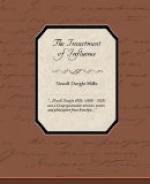Several years ago an industrial war was waged in the coal districts of England that cost that nation untold treasure. It is said that the strife grew out of harsh words between the leaders of the opposing factions. It seemed that the industrious and worthy poor men overlooked the fact that there were industrious and worthy rich men and insisted on speaking only of the idle and spendthrift rich. Then followed his opponent who, as an industrious and worthy rich man, insisted on ignoring the industrious and worthy poor, but spoke only of the idle and thriftless poor, the paupers and parasites. Soon gentleness was forgotten and harshness remembered. Soon there came the trampled cornfields and the bloody streets.
Teachers also need to learn the lesson of Arnold of Rugby. One day the great instructor spake harshly to a dull boy, who an hour afterward came to him with tearful eyes, and in a half-sobbing voice exclaimed; “But why are you angry, sir? I am doing my best.” Then Arnold learned that a lesson easy for one mind may be a torture for another. So he begged the boy’s pardon, and recognized the principle of gentleness that afterward made him the greatest instructor of his time.
Not war, not pestilence, not famine itself, produces for each generation so much misery and unhappiness as is wrought in the aggregate through the accumulated harshness of each generation. Blessed are the happiness-makers! Blessed are they who with humble talents make themselves like the mignonette, creators of fragrance and peace! Thrice blessed are they who with lofty talents emulate the vines that climbing high never forget to blossom, and the higher they climb do ever shed sweet blooms upon those beneath! No single great deed is comparable for a moment to the multitude of little gentlenesses performed by those who scatter happiness on every side and strew all life with hope and good cheer.
Life holds no motive for stimulating gentleness in man like the thought of the gentleness of God. Unfortunately, it seems difficult for man to associate delicacy and gentleness with vastness and strength. It was the misfortune of Greek philosophers and is, indeed, that of nearly all the modern theologians, to suppose that a perfect being cannot suffer. Both schools of thought conceive of God as sitting upon a marble throne, eternally young, eternally beautiful, beholding with quiet indifference from afar how man, with infinite blunderings, sufferings and tears makes his way forward. Yet He who holds the sun in the hollow of his hand, who takes up the isles as a very little thing, who counts the nations but as the dust in the balance, is also the gentle One. Like the wide, deep ocean, that pulsates into every bay and creek and blesses the distant isles with its dew and rain, so God’s heart throbs and pulsates unto the uttermost parts of the universe, having a parent’s sympathy for His children who suffer.




